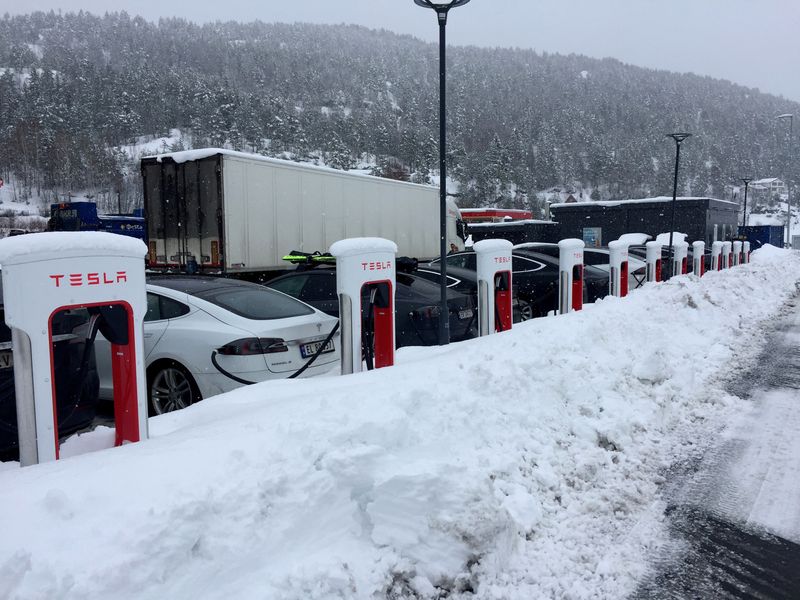By Nerijus Adomaitis
OSLO (Reuters) - The number of battery electric vehicles (BEVs) on Norway's roads is on track to overtake petrol cars by the end of this year or in early 2025, in a first for any country, according to Reuters' and analysts' calculations.
The shift has been driven by generous incentives, afforded in part thanks to Norway's huge oil and gas wealth.
Still, analysts think it will take a few more years for BEVs to surpass the number of diesel vehicles in Norway.
The Nordic country of 5.5 million people aims to become the first nation to end the sale of new petrol and diesel cars - by 2025. Nine out of ten new cars sold at the start of this year have been BEVs.
If more countries follow Norway's lead, demand for oil worldwide could peak earlier than envisaged. The International Energy Agency sees that peak before 2030, with cars and vans accounting for more than 25% of oil demand.
However, Norway's transition has not come cheap, with the country exempting BEVs from taxes imposed on cars with internal combustion engines and investing in public BEV chargers.
BEVs accounted for 24.3% of Norway's 2.9 million cars as of March 15, versus 26.9% for petrol vehicles, according to data from the Norwegian Public Roads Administration seen by Reuters.
That equated to a lead of nearly 76,000 for petrol cars - well below the 104,590 new BEVs sold in Norway last year.
"If that (trend) is continued for the next 12 months and given that sales of pure-petrol cars are negligible now, this time next year there will be more BEVs on the road than pure-petrol cars, and probably before the end of this year," Robbie Andrew, a senior researcher at climate change think-thank CICERO, said.
With almost 370,000 more diesel cars on Norway's roads than BEVs, it will likely take three to four years for BEVs to overtake diesel vehicles too, Andrew added.
Ingvild Kilen Roerholt, head of transport research at Oslo-based think-tank Zero, also saw the number of BEVs moving ahead of petrol cars in Norway this year, despite a recent slowdown in sales.
Sales of new BEVs fell by about a quarter last year in Norway, as new car sales generally declined amid rising interest rates and as the government cut some tax incentives.
Still, BEVs' share of total sales hit a record 92.1% in January, according to the Norwegian Road Federation (OFV).
In March, that share was 89.3%, while new car sales were down 49.7% year-on-year, the latest OFV data show.
Last year, the centre-left government removed a value added tax exemption on BEVs costing more than 500,000 Norwegian crowns ($46,700), making models such as the Tesla X and Audi e-tron more expensive.
Still, the remaining tax exemptions on BEVs cost the state 43 billion crowns in 2023, up from 39.4 billion crowns in 2022, budget documents show.
Despite the recent dip in sales, Roerholt said she was "quite sure" new BEV sales in Norway would top 76,000 this year.
She also predicted the number of BEVs could exceed petrol and diesel cars combined in Norway by 2029.
"For that to happen, we need to reach the goal that 100% of new cars will be zero emissions in 2025," she added.
The surge in popularity of BEVs has led to a decline in demand for petrol and diesel.
Since 2021, sales of diesel and motor gasoline have fallen by around 8% at Norwegian gas stations, according to monthly data from Statistics Norway and Reuters calculations. That excludes diesel sales at truck fuel stations.
"It's still a huge market for fossil fuels. We haven't seen the main dip yet," Kristin Bremer Nebben, head of fuel retailers' association Drivkraft Norge, told Reuters.
Demand for fossil fuels has been partly supported by sales of hybrid cars that combine a battery with an internal combustion engine powered by petrol or diesel.
There were nearly 340,000 hybrid cars on Norwegian roads as of March 15, mostly plug-in hybrids with petrol engines, accounting for 12% of the total fleet, the Norwegian Public Roads Administration data shows.
However, hybrids have been losing market share in recent years as the government has withdrawn incentives.

The Norwegian EV Association expects BEVs to account for 95% of all new cars sales this year.
($1 = 10.7094 Norwegian crowns)